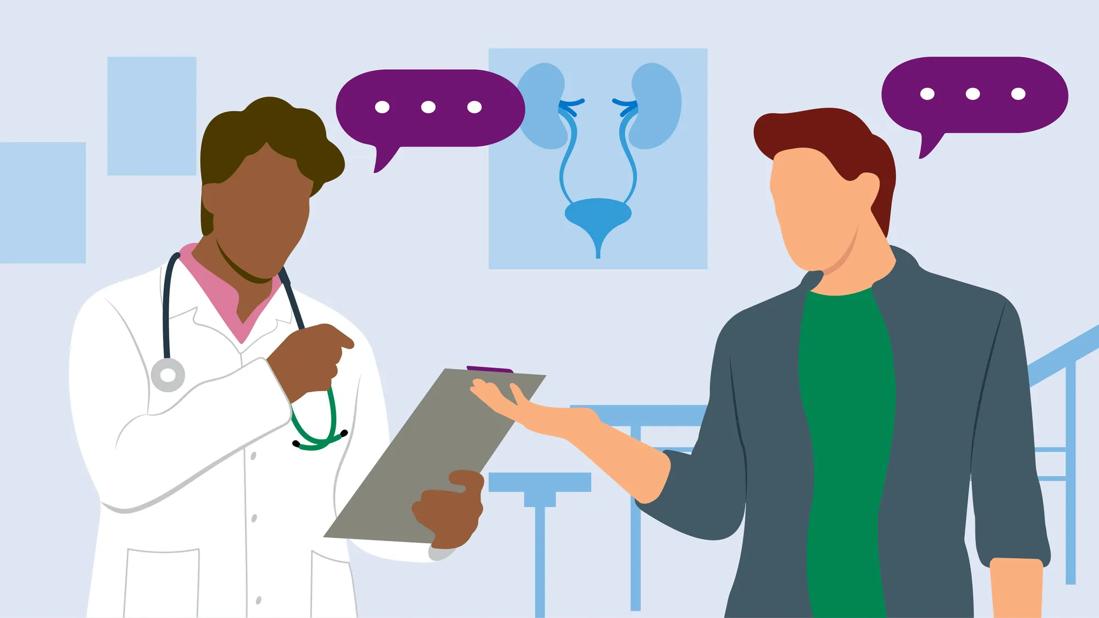Yes, but male UTIs are often the result of another issue like diabetes, prostate problems or kidney stones

Image content: This image is available to view online.
View image online (https://assets.clevelandclinic.org/transform/6e88d4f8-329c-412c-90d1-b000cf21d065/doc-patient-talk-uti-2160584409)
Male patient and healthcare provider discussing kidney health and UTIs
Anyone can get a urinary tract infection (UTI) — including men. That may come as a surprise to some. But up to 20% of males (1 in 5) will have a UTI at some point in their lives, even though they have longer urethras that help keep bacteria out of their bladder. That means if you have a penis, you should be aware of the signs and seek medical care if you ever experience symptoms.
Advertisement
Cleveland Clinic is a non-profit academic medical center. Advertising on our site helps support our mission. We do not endorse non-Cleveland Clinic products or services. Policy
Urologist Andrew Altman, MD, explains when and why men get UTIs and how to treat them.
UTIs occur when bacteria on your skin enter your urethra and multiply. From there, they can make their way up to your bladder, causing a bladder infection (the most common type of UTI). Sometimes, bacteria can travel from your bladder to your kidneys, causing a kidney infection, which can be serious.
Because it’s harder for bacteria to infect male urethras, a UTI is usually a red flag that something else is going on. “Male UTIs tend to be more complicated because there’s often another medical problem causing it,” says Dr. Altman. “This means we need to look for the root cause of the infection so we can address it either by doing additional tests or taking a longer course of antibiotics.”
Some of the causes of UTIs include:
Diabetes can suppress your immune system, lowering your ability to fight illnesses and infections. But it does something else to raise UTI risk.
“People with diabetes often have more glucose (sugar) in their urine,” says Dr. Altman. “The glucose acts as food for bacteria and allows them to thrive. Certain diabetes medications also increase glucose in your urine, potentially causing UTIs as a side effect.”
Advertisement
Some conditions directly interfere with your immune system, including primary immunodeficiency diseases (PIDDs), cancer and HIV. “Just like with diabetes, these conditions make it harder for your body to fend off germs, including those that cause UTIs,” explains Dr. Altman. “Taking immunosuppressant drugs can also raise your risk.”
Some conditions and medications can cause urinary retention, which means your bladder doesn’t completely empty when you pee. This can be a problem because bacteria like to set up shop in leftover urine. And if that urine sits in your bladder long enough, it becomes a potential breeding ground for germs.
Men might have urinary retention if they have:
You can also get UTIs after sex, but UTIs are not STIs.
Unlike STIs, which are viruses and bacteria that spread from person to person during sex, you can’t give someone else a UTI. UTIs often occur as a result of sex because everyone has bacteria living on their skin. If your urethra comes into contact with those bacteria, those tiny organisms might jump at the chance to get inside.
“Anal sex poses a higher risk of a UTI because there are more bacteria in that area,” says Dr. Altman. “But in this case, your partner didn’t spread the infection to you. Your urethra just came into contact with bacteria that made its way up your urinary tract.”
Male UTIs require treatment with antibiotics from your provider. But it’s not as simple as calling in a prescription and sending you home. If you’re dealing with symptoms like dysuria (burning or pain during urination), frequent or urgent urination, blood in your urine or you have a fever, see a healthcare provider right away.
“When we’re treating UTIs in men, we usually order imaging tests to check the prostate and urinary tract,” says Dr. Altman. “We’re looking for blockages or scarring that could cause an infection. Testing allows us to identify and treat the underlying cause and hopefully prevent future UTIs.”
Advertisement
Dr. Altman also stresses the importance of prevention. “Men should get regular prostate exams starting at age 50 to check for BPH,” he advises. “If you have diabetes, work with your provider to keep it under good control.”
Above all, listen to your body and seek care if something seems off. “Males tend to avoid the doctor, and this isn’t a good thing,” notes Dr. Altman. “If you have symptoms of a UTI, your body is telling you something. The sooner you get treatment, the sooner we can help you feel better.”
Advertisement

Sign up for our Health Essentials emails for expert guidance on nutrition, fitness, sleep, skin care and more.
Learn more about our editorial process.
Advertisement
Cranberry juice and cranberry pills may prevent future UTIs when taken consistently
Only antibiotics will cure a UTI, but home remedies could help prevent future infections
Staying hydrated and peeing after sex can help prevent this common post-sex condition
A bladder infection is definitely a UTI ... but not all UTIs are bladder infections
Signs to look out for include pain and changes in frequency or urgency
Recurrent urinary tract infections are most common in women, seniors
The ins and outs of urinary tract infections
A variety of factors can cause temporary or more lasting changes in penis length
Although it could be used as a moisturizer, this new trend is not recommended
Communicating clear limits helps protect your time, energy and emotional well-being
High cholesterol can be genetic, but testing and treatment can lower your heart disease risk